
The minister of health is the minister of the Crown in the Canadian Cabinet who is responsible for overseeing health-focused government agencies including Health Canada and the Public Health Agency of Canada, as well as enforcing the Canada Health Act, the law governing Canada's universal health care system. The current minister is Patty Hajdu.

The Department of Justice is under the executive department of the Philippine government responsible for upholding the rule of law in the Philippines. It is the government's principal law agency, serving as its legal counsel and prosecution arm. It has its headquarters at the DOJ Building in Padre Faura Street, Ermita, Manila.

The Department of Budget and Management is an executive body under the Office of the President of the Philippines. It is responsible for the sound and efficient use of government resources for national development and also as an instrument for the meeting of national socio-economic and political development goals.
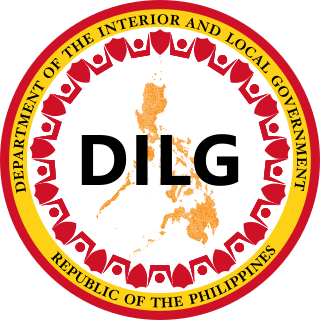
The Department of the Interior and Local Government, abbreviated as DILG, is the executive department of the Philippine government responsible for promoting peace and order, ensuring public safety and strengthening local government capability aimed towards the effective delivery of basic services to the citizenry.

The Department of Education is the executive department of the Philippine government responsible for ensuring access to, promoting equity in, and improving the quality of basic education. It is the main agency tasked to manage and govern the Philippine system of basic education. It is the chief formulator of Philippine education policy and responsible for the Philippine primary and secondary school systems. It has its headquarters at the DepEd Complex in Meralco Avenue, Pasig City.
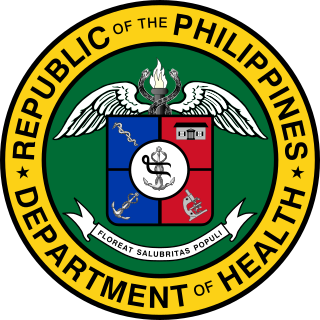
The Department of Health is the executive department of the Government of the Philippines responsible for ensuring access to basic public health services by all Filipinos through the provision of quality health care and the regulation of all health services and products. It is the government's over-all technical authority on health. It has its headquarters at the San Lazaro Compound, along Rizal Avenue in Manila.

The Department of Finance is the executive department of the Philippine government responsible for the formulation, institutionalization and administration of fiscal policies, management of the financial resources of the government, supervision of the revenue operations of all local government units, the review, approval and management of all public sector debt, and the rationalization, privatization and public accountability of corporations and assets owned, controlled or acquired by the government.

The Department of Agriculture, is the executive department of the Philippine government responsible for the promotion of agricultural and fisheries development and growth. It has its headquarters at Elliptical Road corner Visayas Avenue, Diliman, Quezon City.
Executive Schedule is the system of salaries given to the highest-ranked appointed officials in the executive branch of the U.S. government. The president of the United States appoints individuals to these positions, most with the advice and consent of the United States Senate. They include members of the president's Cabinet, several top-ranking officials of each executive department, the directors of some of the more prominent departmental and independent agencies, and several members of the Executive Office of the President.
CAP College Foundation, Inc. is a private, non-sectarian, distance learning college in the Philippines.

Francisco Tiongson Duque III is a Filipino physician and government official serving as Secretary of Health since 2017 in the Cabinet of President Rodrigo Duterte, a position he had previously held from 2005 to 2010 in the Cabinet of President Gloria Macapagal Arroyo. From 2010 to 2015, he served as the Chairman of the Civil Service Commission.
Karina Constantino David was a Filipino activist, public servant, and musician best known for being a former chairperson of the Civil Service Commission of the Philippines, and for her opposition to the Martial Law dictatorship of Ferdinand Marcos as part of the activist duo "Inang Laya". She also served as the chairperson of the Career Executive Service Board, a government entity supervising the top management personnel of the Philippine government. She was a member of the Government Service Insurance System (GSIS) Board of Trustees.

The Philippine Drug Enforcement Agency is the lead anti-drug law enforcement agency, responsible for preventing, investigating and combating any dangerous drugs, controlled precursors and essential chemicals within the Philippines. The agency is tasked with the enforcement of the penal and regulatory provisions of Republic Act No. 9165, otherwise known as the Comprehensive Dangerous Drugs Act of 2002.
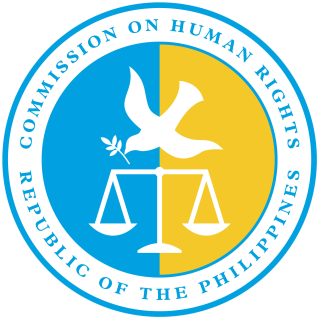
The Commission on Human Rights (CHR) is an independent constitutional office created under the 1987 Constitution of the Philippines, with the primary function of investigating all forms of human rights violations involving civil and political rights in the Philippines.

The Commission on Audit, abbreviated as COA, is an independent constitutional commission established by the Constitution of the Philippines. It has the primary function to examine, audit and settle all accounts and expenditures of the funds and properties of the Philippine government.

The Insular Government of the Philippine Islands was a territorial government of the United States that was established in 1901 and was dissolved in 1935. The Insular Government was preceded by the United States Military Government of the Philippine Islands and was followed by the Commonwealth of the Philippines.
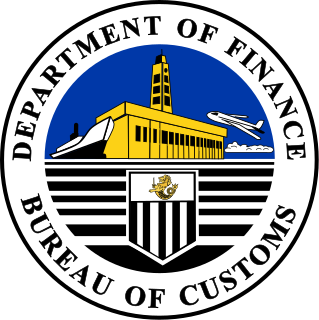
The Bureau of Customs is a Philippine government agency under the Department of Finance. The Bureau of Customs was established on February 6, 1902 by the Insular Government of the Philippine Islands of the United States of America, during the American Colonial Era of the Philippines.
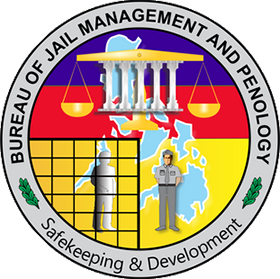
The Bureau of Jail Management and Penology is an attached agency of the Department of the Interior and Local Government mandated to direct, supervise and control the administration and operation of all district, city and municipal jails in the Philippines with pronged tasks of safekeeping and development of its inmates, officially classed as persons deprived of liberty (PDL).

















